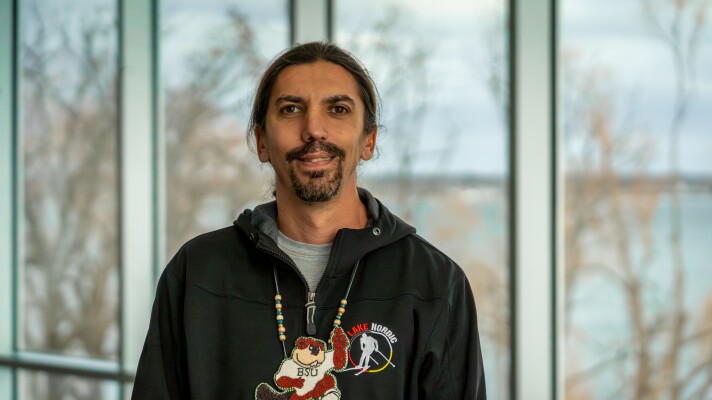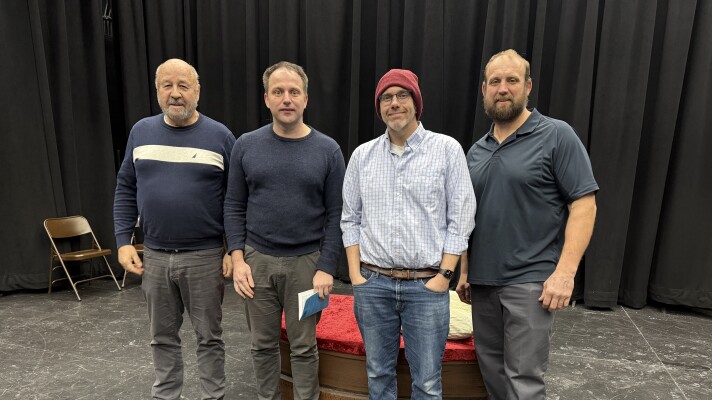BRAINERD — Mariia Harytonova is not your typical college student. With war raging in her home country of Ukraine, Mariia is working to give voice to her people from her new home in Brainerd.
Mariia fled her country of Ukraine and came to Central Lakes College. She has now published a book with stories about life in Ukraine called “24.” She recently joined the KAXE Morning Show to share more about her experiences.
The number 24, signifying the date Russia invaded Ukraine in February 2022, has become what she describes as “fatal for the Ukrainian nation.” More than 6 million refugees have fled Ukraine with millions more displaced within the country.
Life changes
On Feb. 24, 2022, Mariia was living her life and working toward two bachelor's degrees in art and music at her university in Uman, Ukraine, about 130 miles south of Kyiv.
At 5 a.m. she woke up to a strange sound. Thunder in February?
She knew war could be coming, but Mariia said it didn’t seem real. When the second loud noise came and the house started shaking, it became clear it wasn’t thunder.
Mariia’s family found themselves living in a war zone. The idea of war was so stressful, they didn’t even have emergency bags ready.

“It's impossible,” she said on the KAXE Morning Show. “Neighbor can come to your house and say, ‘No, that's our house right now. So, it's not yours anymore.’”
People’s homes were no longer their own — and needed to be left behind.
It was hard for Mariia and her family to leave their home. Her great-grandfather built it after World War II, and four generations have lived their lives in the same house.
Like a lot of Ukrainians, Mariia ended up in Poland, but she struggled to find work. Her connection with a missionary family from the Journey North Community Church in Baxter gave her a way out of war.
The journey out of Ukraine
Russia was bombing close to Mariia’s city of Uman. Suddenly, her hometown became a target.
The town government issued an evacuation. Mariia and her family ended up in a small village in what she describes as “the middle of nowhere,” in a house with 14 people in two rooms.
The living conditions were not easy.
Mariia found inspiration from a mother also staying in the house. Mariia says this mother was so calm with her child. “She was (an) example for me. Like how you need to behave in this,” she said.
“If you want to go (to the) restroom, if you want to eat, if you want water — no one cares."Mariia Harytonova
Most of the 14 people cramped together in the temporary, shared living conditions slept on the floor. The house had one fireplace, which could not keep the house warm.
“It was horrible. It was many people,” Mariia said. “ … My mom said like if it's our destiny to die, let's die in our new couch. In our lovely house.”
So they went back to Uman. But it didn’t last long. Poland turned out to be the better alternative for their safety.
The family drove three days in two cars with eight people, plus Mariia’s cat in a backpack. But when they arrived at the Polish border, there was a line of empty cars. They were told they could not drive, so they had to travel the rest of the way on foot. Leaving the car at 8 p.m., they finally reached the border at 3 a.m.
“It was night and it was so many kids,” she said. “ … I remember, it was a woman with like six kids. She was carrying two kids, and this little kid was carrying the suitcase.”
When they reached the border, they found a crowd of about a thousand people. Quickly it became obvious: if they wanted to get into Poland, they had to stay in their spots.
“If you want to go (to the) restroom, if you want to eat, if you want water — no one cares,” she said.
When asked if she understood the current conflict in Palestine differently than most, Mariia hesitated. She said war had now become commonplace.

“A couple months ago, I was (watching) the news and I saw like, it was a missile strike again and it was probably in Kyiv. I don't remember what place it was,” she said. “(I read) 10 people injured, like two people killed.
“And you know what I said? I said, ‘(It) was only two people killed. It's only two people.’ I said, like, ‘Oh, it's not a big deal.’ But, you know — like my mind started playing games with me.”
Mariia realized war was now normalized to her — and she and her country of Ukraine were changed dramatically. “Like it was something … unexpected from me and it's totally not me. Because no, it's not OK.”
Writing a book
When she arrived in America, Mariia said she felt survivor’s guilt.
Her mother had returned to the Ukraine. It became difficult for her to be safe in Minnesota and not be able to do something to help. She had already held fundraisers and worked with Impact Ukraine, a nonprofit ministry, but it didn’t feel like enough.
“My mom said like if it's our destiny to die, let's die in our new couch. In our lovely house.”Mariia Harytonova
While living in Ukraine, writing was a hobby for Mariia. She thought sharing the stories might make a difference, which led to publishing “24.”
Mariia at this time was also working to learn Polish with Sofia Vasylenko from Ukraine. While in a language lesson, Mariia told Sofia of her plans to write a book. A professional editor and writer, Sofia offered to help.
They worked day and night. Mariia would find people and write down everything they said.
“All the stories were painful. After that, we called each other, and Sofia took up the stories.”
In April they had everything almost finished when Russia charged Uman, Mariia’s city. Twenty-three people died, including six children.
Sofia lived in a house very close to the blast, according to Mariia.
“By then, we understood more than ever what we are doing,” Mariia said. “We were documenting all the activities of a terrorist country and let the whole world know about the ugly future of the Russian army.”
The book includes 24 stories and 24 tragedies. Find out more at 24thebook.com. Money raised from sales of the book support the people of Ukraine.












